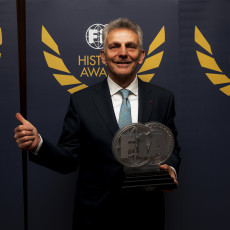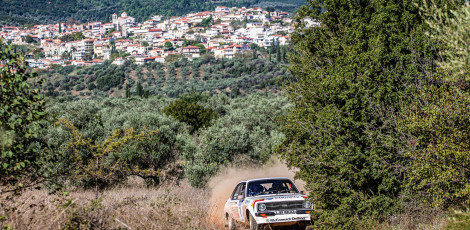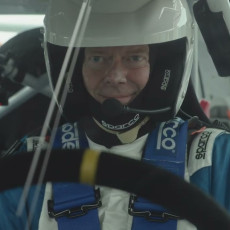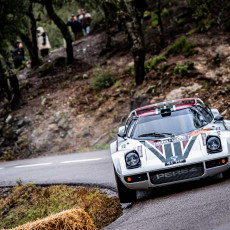
Historic Rally Championship
European Historic Rally Championship
The FIA European Historic Rally Championship remains the ultimate celebration of rallying’s glorious past, which each season is highlighted by the variety of competing cars representing the 1960s, 1970s, 1980s, 1990s and, from 2025, the year 2000.
At the same time, the championship continues to provide an accessible platform for drivers with varying levels of experience and resource to compete at an international level.
How it works?
Catering for historic rally cars built prior to 1969 and homologated up to December 31, 1992, carrying an Historic Technical Passport issued by the FIA, the FIA European Historic Rally Championship (FIA EHRC) is divided into four categories (1-4) based on year of manufacturer. Sub-divisions in Categories 2-4 to allow for different levels of car performance.
While an update to Appendix K of the International Sporting Code allows competition cars built between 1991 and 2000 to carry the Historic Technical Passport and compete in FIA championships and international motor sport events, cars homologated between 1993 and 2000 will do so in the FIA EHRC within a single class in 2025. However, they will not be eligible for championship points during the 2025 season.
Period J2 cars in Category 4 are eligible up to December 31, 1992, specification.
On all FIA EHRC events, cars in Category 1-4 are grouped together on each leg. Any other cars, including those homologated between 1993-2000, are seeded behind.
Calendar explained
The 2025 FIA European Historic Rally Championship is contested over 10 rounds between March and November.
Rallye Antibes Historic in France, Ardeca Ypres Historic Rally in Belgium and Historic Rally Fafe in Portugal are new additions to the calendar for 2025. They take place along with seven rallies that helped to make the 2024 FIA EHRC a huge success, Rally Costa Brava (Spain), Historic Vltava Rallye (Czech Republic), Historic Rallye Weiz (Austria), Lahti Historic Rally (Finland), Historic Acropolis Rally (Greece), Rallye Elba Storico (Italy) and Rally de Asturias Histórico (Spain).
Apart from Lahti Historic Rally and Historic Acropolis Rally, all events take place on asphalt.
Events typically run for one and a half days following reconnaissance with approximately 150 timed kilometres on offer.
Titles up for grabs
The overall title is contested by all drivers and co-drivers regardless of their category.
The FIA European Historic 1600cc Trophy is for cars up to 1600cc from Categories 1-4.
The FIA European Historic Front Wheel Drive Trophy is for front-wheel-drive cars from Categories 1-4.
The FIA European Historic Teams’ Trophy is for registered teams.
Although the 2025 FIA EHRC calendar gives crews 10 opportunities to compete, the sporting regulations allow drivers and co-drivers to count their best six scores for all categories, classes and trophies.
Ten bonus points are awarded to crews starting Historic Vltava Rallye, round two of the season in April, and Historic Rally Fafe, the deciding event of the season in November. Two bonus points continue to be awarded to crews starting all other rounds.
The FIA EHRC Sporting Regulations for 2025 are available HERE.
FlexiFly partnership continues into 2025
FlexiFly, a specialist aircraft hire company, remains an official partner to the FIA EHRC. During each round of the FIA EHRC, registered crews will take part in an official photocall and receive a commemorative cap. Bespoke digital content highlighting the partnership between the FIA EHRC and FlexiFly will also be produced.
Under the guidance of FIA EHRC stalwart contender Ernie Graham, FlexiFly has grown to become one of the United Kingdom’s leading providers of private aircraft hire services. It’s also a long-term supporter of the FIA EHRC through its participation in the FIA European Historic Rally Championship for Teams. FlexiFly driver James Potter won the FIA EHRC Category 1 title in 2024.
More information:
Jamie Edwards, FIA EHRC Sporting Delegate, historic@fia.com
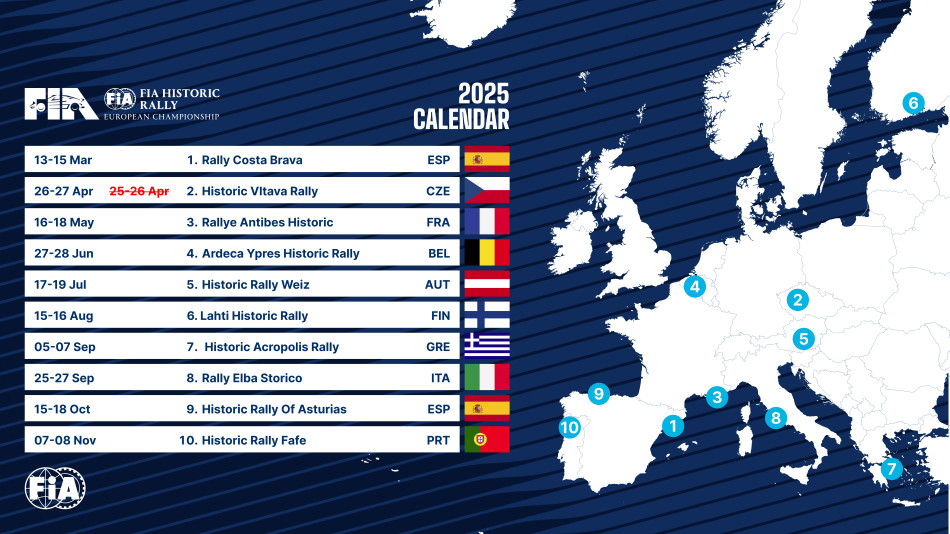

 Facebook
Facebook Twitter
Twitter